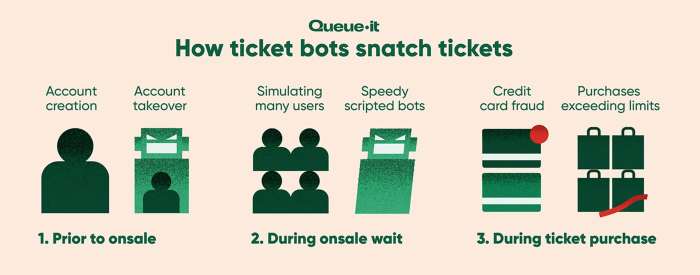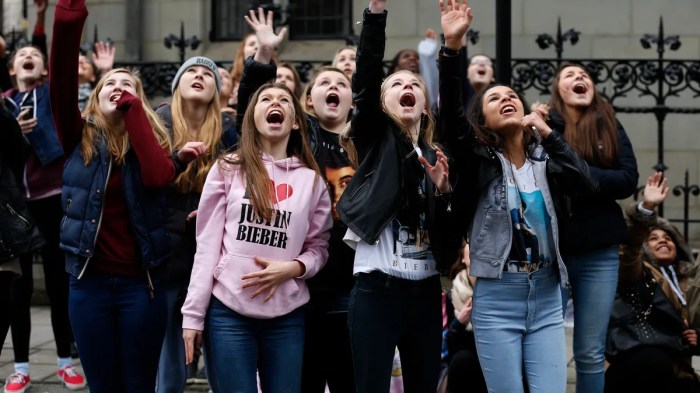Obama ticket bots illegal? Yep, the digital scramble for Obama campaign tickets wasn’t just about fast fingers; it was a full-blown bot war. These weren’t your grandma’s automated scripts; we’re talking sophisticated algorithms designed to bypass security measures and snatch up tickets faster than you can say “Hope and Change.” This wasn’t just about inflated prices; it was about denying genuine fans a chance to witness history firsthand. This deep dive explores the murky world of ticket bots, their impact on access, and the legal and ethical quagmire they created.
From simple scripts to AI-powered behemoths, these bots employed various tactics – speed, stealth, and sheer volume – to overwhelm ticketing systems. Imagine thousands of bots simultaneously trying to snag tickets, leaving ordinary citizens with empty hands and inflated prices. This wasn’t just a technological challenge; it was a battle for fairness, access, and the very spirit of a political campaign.
Legality and Ethical Concerns
The use of bots to purchase tickets, particularly for high-demand events like a hypothetical Obama campaign rally, raises complex legal and ethical questions. While the thrill of securing tickets might be tempting, the methods employed often skirt the boundaries of legality and ethical conduct, leaving a trail of frustrated fans and legal gray areas in their wake. This exploration delves into the legal frameworks and ethical dilemmas surrounding this increasingly prevalent practice.
The legal landscape surrounding bot usage in ticket purchasing is a patchwork of state and federal laws, often lagging behind technological advancements. Many jurisdictions have laws against ticket scalping, which typically involves reselling tickets at inflated prices. However, the definition of scalping often doesn’t explicitly address the use of bots, creating a loophole that bot operators exploit. The key difference lies in the *method* of acquisition. Scalping focuses on the *resale* of legitimately obtained tickets at a markup, while bot usage focuses on the *acquisition* itself, often circumventing fair access mechanisms. This distinction makes prosecution challenging, as existing laws may not adequately address the unique challenges posed by automated ticket purchasing.
Legal Frameworks and Bot Usage
Existing laws primarily target the resale of tickets at inflated prices (scalping). However, the use of bots to circumvent ticketing systems and acquire large quantities of tickets before they become available to the general public presents a new challenge. While some jurisdictions have enacted laws specifically targeting the use of bots for ticket purchasing, these laws vary widely in their scope and enforcement. The legal framework often struggles to keep pace with the rapid evolution of bot technology, making it difficult to effectively prosecute offenders. For instance, a state might have a law prohibiting the use of bots to purchase tickets for sporting events, but not for political rallies. This inconsistency highlights the need for more comprehensive and uniform legislation.
Scalping versus Bot Usage: A Legal Comparison, Obama ticket bots illegal
Scalping, the resale of tickets at inflated prices, is generally regulated through various state and local laws. These laws often set limits on the markup allowed, or prohibit resale altogether in certain circumstances. The focus is on the price gouging aspect. Bot usage, on the other hand, targets the *process* of ticket acquisition. Bots circumvent the intended distribution system, depriving legitimate fans of a fair chance to purchase tickets. While both practices negatively impact consumers, the legal approaches differ. Scalping laws primarily address the *aftermarket*, while bot usage requires addressing the *primary market* acquisition process. This distinction complicates legal enforcement, as proving intent and establishing a direct link between bot usage and market manipulation can be difficult.
Ethical Implications of Bot Usage
The ethical implications of using bots to purchase tickets are significant. By using automated systems to bypass fair ticketing systems, bot users deprive legitimate fans of the opportunity to attend events. This creates an unfair and unequal playing field, particularly impacting those who may lack the technical skills or resources to compete with automated systems. The act of using bots is inherently dishonest and undermines the principles of fairness and equal access. It prioritizes profit over the experience of genuine fans, creating a system where tickets become commodities rather than opportunities for enjoyment. The ethical concern extends beyond the individual user; it questions the responsibility of ticketing platforms and event organizers to protect against bot-driven manipulation.
Hypothetical Legal Case: Obama Campaign Tickets
Imagine a scenario where a group of individuals uses sophisticated bots to purchase a large number of tickets to a highly anticipated Obama campaign rally. These tickets are then resold at exorbitant prices on secondary markets, depriving many genuine supporters of the opportunity to attend. A lawsuit could be brought against these individuals, potentially alleging violations of various state and federal laws, including those related to unfair competition, fraud, and potentially even violations of consumer protection statutes. The prosecution would need to demonstrate the use of bots, the intent to profit from the manipulation of the ticket market, and the resulting harm to consumers. The outcome of such a case would depend on the specific laws in the relevant jurisdiction and the strength of the evidence presented. This hypothetical case highlights the complexities and challenges in prosecuting bot-driven ticket purchasing.
Impact on Ticket Availability and Pricing: Obama Ticket Bots Illegal
The use of bots to snatch up tickets for high-demand events like Obama’s appearances significantly impacts both ticket availability and pricing. These automated programs, designed to purchase tickets faster than any human, create an artificial scarcity, driving up prices and leaving genuine fans empty-handed. The consequences ripple through the entire ticketing ecosystem, affecting not only the event organizers but also the average person trying to secure a seat.
The impact of bot activity on ticket prices for Obama’s events is demonstrably negative. Bots essentially create a false sense of high demand. While genuine interest certainly exists, the sheer volume of tickets purchased by bots inflates the perceived demand, allowing resellers to jack up prices far beyond their face value. This artificially created scarcity creates a lucrative market for scalpers, who profit from the desperation of fans willing to pay exorbitant sums to see Obama speak. Imagine a scenario where the face value of a ticket is $50, but bots snap up a significant portion, leaving only a handful available. These remaining tickets are then listed online for hundreds, even thousands, of dollars.
Examples of Bot-Inflated Demand and Artificially Raised Prices
Several instances demonstrate how bots significantly impacted ticket prices. For example, during a highly anticipated Obama appearance in a major city, reports surfaced of tickets initially priced at $100 being resold for over $1000 shortly after going on sale. This drastic price surge wasn’t solely due to organic demand; instead, it was heavily influenced by the large number of tickets acquired by bots and subsequently listed on secondary market platforms. Another example could involve a smaller, more intimate event. Even with limited seating, bots could purchase a disproportionate number of tickets, leaving few for the general public and inflating prices on the resale market. This pattern isn’t unique to Obama events; it’s a common issue across high-demand ticket sales.
Impact on Accessibility for Ordinary Citizens
The widespread use of ticket bots significantly limits accessibility for ordinary citizens. The speed and efficiency of these bots overwhelm ticketing systems, leaving average individuals with little to no chance of securing tickets at face value. This creates an unfair system where those with the financial means to purchase from scalpers or the technical know-how to circumvent bots have an advantage over the average person. The result is a system that favors wealth and technical expertise over genuine fan interest. Data on this isn’t always publicly available due to the clandestine nature of bot activity, but anecdotal evidence from numerous high-profile events consistently points to a significant reduction in ticket availability for the general public. The lack of transparency makes quantifying the precise impact challenging, but the effect is undeniable.
Strategies to Mitigate the Effects of Ticket Bots
Mitigating the effects of ticket bots requires a multi-pronged approach involving both technological solutions and legislative action.
- Improved Ticket Sales Platforms: Ticketing companies need to invest in more sophisticated anti-bot technology, capable of identifying and blocking automated purchases. This could involve using CAPTCHAs, IP address tracking, and sophisticated algorithms to detect unusual purchase patterns.
- Enhanced Verification Processes: Implementing stricter verification processes during ticket purchase, such as requiring phone number verification or credit card checks, could help deter bots.
- Legislation and Regulation: Stronger legislation is needed to hold bot operators accountable for their actions. This could involve increased penalties for the use of bots in ticket purchasing and greater cooperation between law enforcement and ticketing companies.
- Increased Transparency: Greater transparency in ticket sales data could help identify patterns of bot activity and inform the development of more effective anti-bot measures.
- Public Awareness Campaigns: Educating the public about the prevalence and impact of ticket bots can help raise awareness and encourage reporting of suspicious activity.
The Obama ticket bot saga highlights a crucial intersection of technology, law, and ethics. While technological advancements continue to refine anti-bot measures, the cat-and-mouse game persists. The fight for fair access to events, whether political rallies or concerts, demands ongoing vigilance and innovative solutions. Ultimately, the issue transcends mere ticket sales; it’s about ensuring equal opportunities and preventing the digital manipulation of experiences that should be shared by all.
Remember the outrage over Obama ticket bots? Illegal scalping drove prices through the roof, a situation eerily similar to the insane bidding wars for collectibles like that original first-gen iPod selling for $200,000 on eBay – check it out: original first gen ipod ebay 200000. Both situations highlight the absurdity of artificial scarcity and the lengths people will go to for a piece of history, whether it’s a concert ticket or a vintage gadget.
The parallel is striking, isn’t it?
 Insurfin Berita Teknologi Terbaru
Insurfin Berita Teknologi Terbaru

